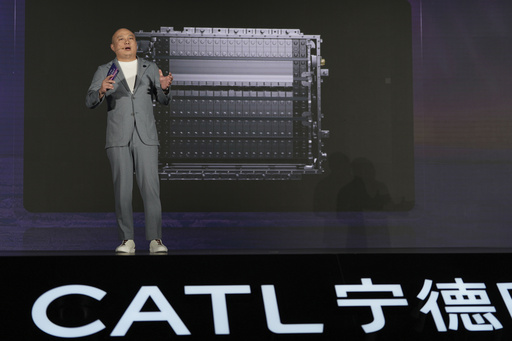BARCELONA, Spain — The Chinese electric battery manufacturer CATL and automotive giant Stellantis have made a significant announcement about their collaboration to establish a prominent battery factory in northern Spain.
The facility will be situated in Zaragoza, and production of lithium iron phosphate batteries is anticipated to commence by the conclusion of 2026.
This joint venture is set to bring an investment of €4.1 billion (approximately $4.3 billion), as stated by the partners. The factory aims for carbon neutrality, leveraging Spain’s substantial renewable energy resources, including solar, wind, and hydropower.
This recent announcement follows a partnership agreement made in November 2023 between CATL and Stellantis focused on battery manufacturing, a crucial aspect of the expanding electric car market in Europe.
European automotive manufacturers face challenges in catching up to their Chinese rivals in the electric vehicle sector, which is becoming increasingly important as part of the European Union’s transition to greener technologies. The EU has announced that its 27 member states will phase out the production of internal combustion engine vehicles by 2035.
To protect local manufacturers and stimulate the relocation of Chinese production to Europe, the EU, similar to the United States, is imposing tariffs on electric vehicles imported from China.
CATL and other Chinese battery producers lead significantly in electric vehicle battery production, while Northvolt, seen as Europe’s potential leader in this field, unfortunately filed for bankruptcy last month. With existing factories in Germany and Hungary, CATL continues to expand its footprint in Europe.
This partnership was formalized shortly after Spanish Prime Minister Pedro Sánchez held a meeting with CATL Chairman Robin Zeng in Madrid. Spain is the second-largest car producer in the EU, following Germany. Following the official announcement of the deal, Sánchez expressed his contentment via a post on social media platform X.
Jordi Hereu, Spain’s Minister of Industry, praised the collaboration, highlighting that it received financial support through Europe’s post-pandemic recovery initiative, which aligns with Spain’s ambitious proposal to promote electric vehicles.
Hereu remarked, “We all have a lot riding on the transition toward an electric transport model. Therefore, we consider this investment to be a great sign that the car industry believes in Spain.”
Stellantis encompasses several well-known automotive brands, including Chrysler, Citroen, Dodge, Jeep, Peugeot, Fiat, Opel, and Alfa Romeo. Within Spain, Stellantis operates manufacturing plants in Zaragoza, Vigo, and Madrid.
The production of electric vehicles in Spain has surged impressively, increasing from just 16,000 units in 2019 to 323,000 in 2023. However, this figure still represents approximately 13% of the total vehicle production of 2.4 million, as reported by ANFAC, the Spanish Association of Automobile and Truck Manufacturers. In 2023, Germany led Europe with a total production of 4.1 million vehicles across all types, according to ANFAC.
Additionally, Volkswagen Group, through its Spanish subsidiary SEAT, outlined plans in 2022 to establish an electric battery manufacturing facility in the eastern Valencia region of Spain.


